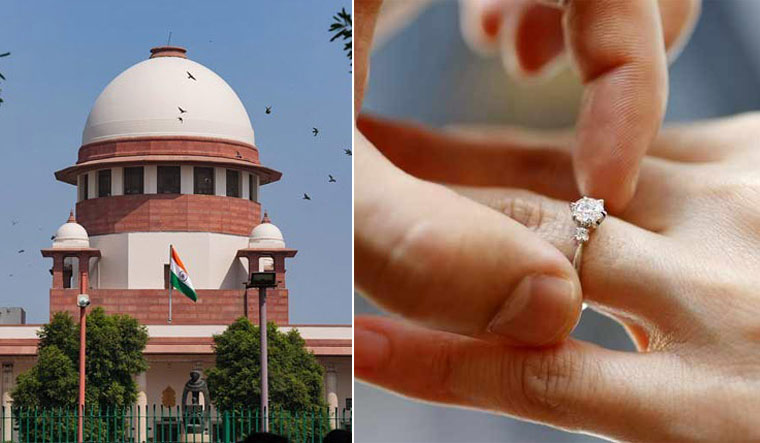Activists, lawyers and women rights bodies on Monday welcomed the Supreme Court decision to do away with the six-month waiting period for divorce through mutual consent under some conditions, saying it will give a chance to women to move on and plan their future.
The apex court held on Monday it has the discretion to dissolve a marriage on the ground of irretrievable breakdown in exercise of its plenary power under Article 142 (1) of the Constitution and can grant divorce by mutual consent while dispensing with the 6-month waiting period mandated under the Hindu Marriage Act, 1955.
National Commission for Women (NCW) chairperson Rekha Sharma said the decision will help women move ahead in their lives.
"I welcome the decision. If done with mutual consent, it will give a chance to women to move ahead in their lives and plan their future," she told PTI.
Women rights activist and founder of PARI (People Against Rapes in India) Yogita Bhayana said it is a progressive verdict, but the term 'irretrievable breakdown of marriage' should be clearly defined.
"Also, how the alimony would be given should be clearly stated," she told PTI.
Lawyer Prabhsahay Kaur said the top court verdict is premised on the principle that no consenting adults should be forced to continue a marriage which has irretrievably broken down.
She said the court has taken a balanced view and clarified that the grant of divorce under such circumstances cannot be done on a regular basis.
"In my view, there are two basic principles on which this judgement is premised --firstly, it is the duty of the court, and particularly, the Supreme Court to do complete justice to the parties, in which endeavour court should not be bogged down by procedural requirements; secondly, no two consenting adults who have had an irretrievable breakdown of marriage should be forced to be in a formal legal relationship, for that causes more misery and acrimony and is against the interest of both parties, Kaur said.
The lawyer called it a welcome move, but said the court has also cautioned against its use regularly and stated that it should be exercised with care and caution, while listing out factors that should be applied.
Advocate Abhishek Prasad said the judgement has reaffirmed the Supreme Court's powers to do complete justice and rightly outweighed the interests of the parties over procedural requirements.
He said the judgement reinforces the idea that delaying the grant of divorce in marriages that cannot be repaired only leads to prolonging the agony of the parties.
"The judgment reinforces the idea that where a marriage has irretrievably broken down, prolonging its dissolution only prolongs the agony of the parties. While the six months waiting period has been made mandatory with a view to explore the possibility of reconciliation, in cases where there is no possibility of reconciliation, this becomes a mere procedural formality, he added.
Prasad said requiring such couples to nonetheless comply with this formality/ technicality is nothing short of injustice.
"The Supreme Court having considered the same and being a court of equity as well as being entrusted with doing complete justice, has rightly outweighed the interests of the parties over procedural requirements. With this landmark judgment, the wide ambit of the powers that the Supreme Court has for imparting justice stands reaffirmed and settled," he said.
Activist Ranjana Kumari said there is no point in wasting time in case of "irretrievable breakdown of marriage".
The judgement is progressive and it is very good for both. In six months, the inspectors who do the counselling do not even understand the issue, she told PTI.
Senior advocate and SCBA president Vikas Singh, however, argued that the matter was already looked into by the Parliament and the same should not have been adjudicated by the court.
"... perhaps twice the Bills were moved in Parliament to amend the Hindu Marriage Act to include the aspect of irretrievable breakdown' of marriage as a ground of divorce and the Parliament rejected it twice. You can give a judgement where you see that there was a grey area which the Parliament did not discuss or thought of. But, here the Parliament thought over the issue and rejected it," he said.
"The irretrievable breakdown of marriage as grounds of divorce has been rejected by Parliament. They are wanting to make it a ground of divorce in the Hindu Marriage Act, but this is not a ground in India. This is under several western jurisdictions as a ground of divorce. According to me, this is not the subject which could have been adjudicated by the court in the judicial pronouncement," Singh added.
A five-judge constitution bench headed by Justice S K Kaul on Monday said grant of divorce by the apex court on the ground of irretrievable breakdown of marriage is not a matter of right, but a discretion which is to be exercised with great care and caution, keeping in mind several factors ensuring that complete justice' is done to both parties.
The bench was dealing with questions, including whether the top court can grant divorce in exercise of power under Article 142(1) of the Constitution when there is complete and irretrievable breakdown of marriage in spite of the other spouse opposing the prayer.



